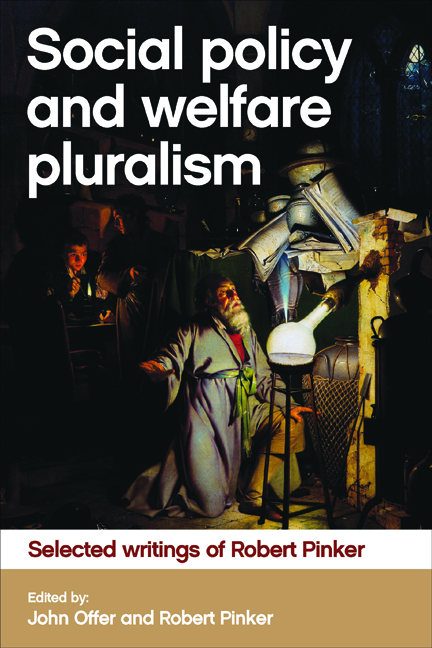Book contents
- Frontmatter
- Contents
- Acknowledgement
- Preface
- General introduction: Robert Pinker on rethinking approaches to welfare
- Introduction to Part One On social policy studies
- one The ends and means of social policy: a personal and generational perspective
- two Social theory and social policy: a challenging relationship
- three Stigma and social welfare
- four The welfare state: a comparative perspective
- five Richard Titmuss and the making of British social policy studies after the Second World War: a reappraisal
- Introduction to Part Two On social care, communities and the conditions for well-being
- six Report of the Working Party on the Role and Tasks of Social Workers: an alternative view
- seven The quest for community: from the Settlement Movement to the Griffiths Report: an historical perspective
- eight Citizenship, civil war and welfare: the making of modern Ireland
- Introduction to Part Three On welfare pluralism
- nine Golden Ages and welfare alchemists
- ten From gift relationships to quasi-markets: an odyssey along the policy paths of altruism and egoism
- eleven The experience of citizenship: a generational perspective
- twelve The right to welfare
- thirteen The prospects for social policy in the UK after the 2015 General Election
- Afterword On the post-Brexit prospects for social policy in the UK
- References
- Index
eight - Citizenship, civil war and welfare: the making of modern Ireland
Published online by Cambridge University Press: 08 April 2022
- Frontmatter
- Contents
- Acknowledgement
- Preface
- General introduction: Robert Pinker on rethinking approaches to welfare
- Introduction to Part One On social policy studies
- one The ends and means of social policy: a personal and generational perspective
- two Social theory and social policy: a challenging relationship
- three Stigma and social welfare
- four The welfare state: a comparative perspective
- five Richard Titmuss and the making of British social policy studies after the Second World War: a reappraisal
- Introduction to Part Two On social care, communities and the conditions for well-being
- six Report of the Working Party on the Role and Tasks of Social Workers: an alternative view
- seven The quest for community: from the Settlement Movement to the Griffiths Report: an historical perspective
- eight Citizenship, civil war and welfare: the making of modern Ireland
- Introduction to Part Three On welfare pluralism
- nine Golden Ages and welfare alchemists
- ten From gift relationships to quasi-markets: an odyssey along the policy paths of altruism and egoism
- eleven The experience of citizenship: a generational perspective
- twelve The right to welfare
- thirteen The prospects for social policy in the UK after the 2015 General Election
- Afterword On the post-Brexit prospects for social policy in the UK
- References
- Index
Summary
Since the time of T.H. Marshall, the concept of citizenship has held a position of central significance in the study of social policy, notably with regard to the evolution of civil, political and social rights and duties. Less attention has been given to the association of citizenship with the growth of national consciousness and issues of national and cultural identity. Most social policy theories about the relationship between citizenship and welfare take the existence of a shared sense of national identity under conditions of peace for granted. The few social theorists who have written about the impact of war on the growth of civil, political and social rights have tended to concentrate on wars between sovereign states. Much less has been written about the significance of civil wars within sovereign states. Conflicts about land, sovereignty and national identity are the most frequent causes of these internal conflicts. This paper explores the extent to which the onset of civil war reverses the direction in which Marshall hypothesised that the civil, political and social rights of citizenship developed under conditions of peace, taking the examples of Ireland and Northern Ireland for illustrative purposes.
The Marshall perspective
Marshall developed a theory of citizenship and welfare that was explicitly pluralist in character and sympathetic to the roles of both competitive markets and a mixed economy of welfare. He defined citizenship as ‘a status bestowed on those who are full members of a community. All who possess the status are equal with respect to the rights and duties with which the status is endowed’ (Marshall and Bottomore, 1992: 18). Citizenship, in this broader and more general sense, becomes a basis for social solidarity. The pluralist character of Marshall's approach unfolds as he proceeds to identify three key elements in the status of citizenship. The first of these elements comprises our civil rights and obligations with regard to ‘personal liberty, freedom of speech, thought and faith, the right to own property and to conclude valid contracts and the right to justice’ (Marshall and Bottomore, 1992: 8). The second of these elements is ‘the right to participate in the exercise of power’ either as a voter or as a representative.
- Type
- Chapter
- Information
- Social Policy and Welfare PluralismSelected Writings of Robert Pinker, pp. 171 - 186Publisher: Bristol University PressPrint publication year: 2017



